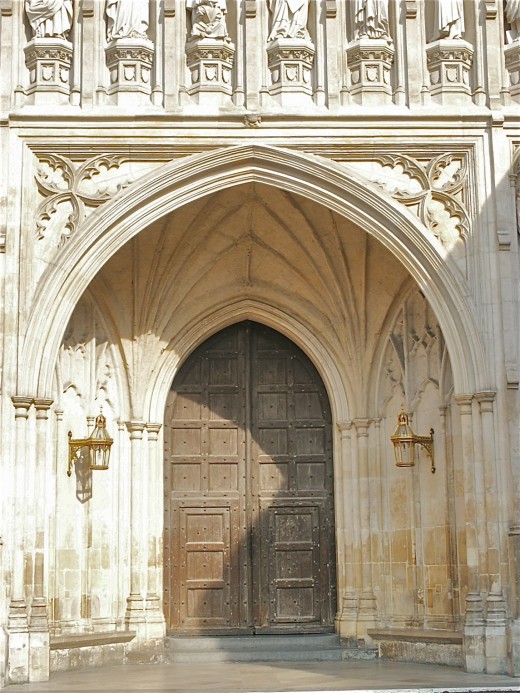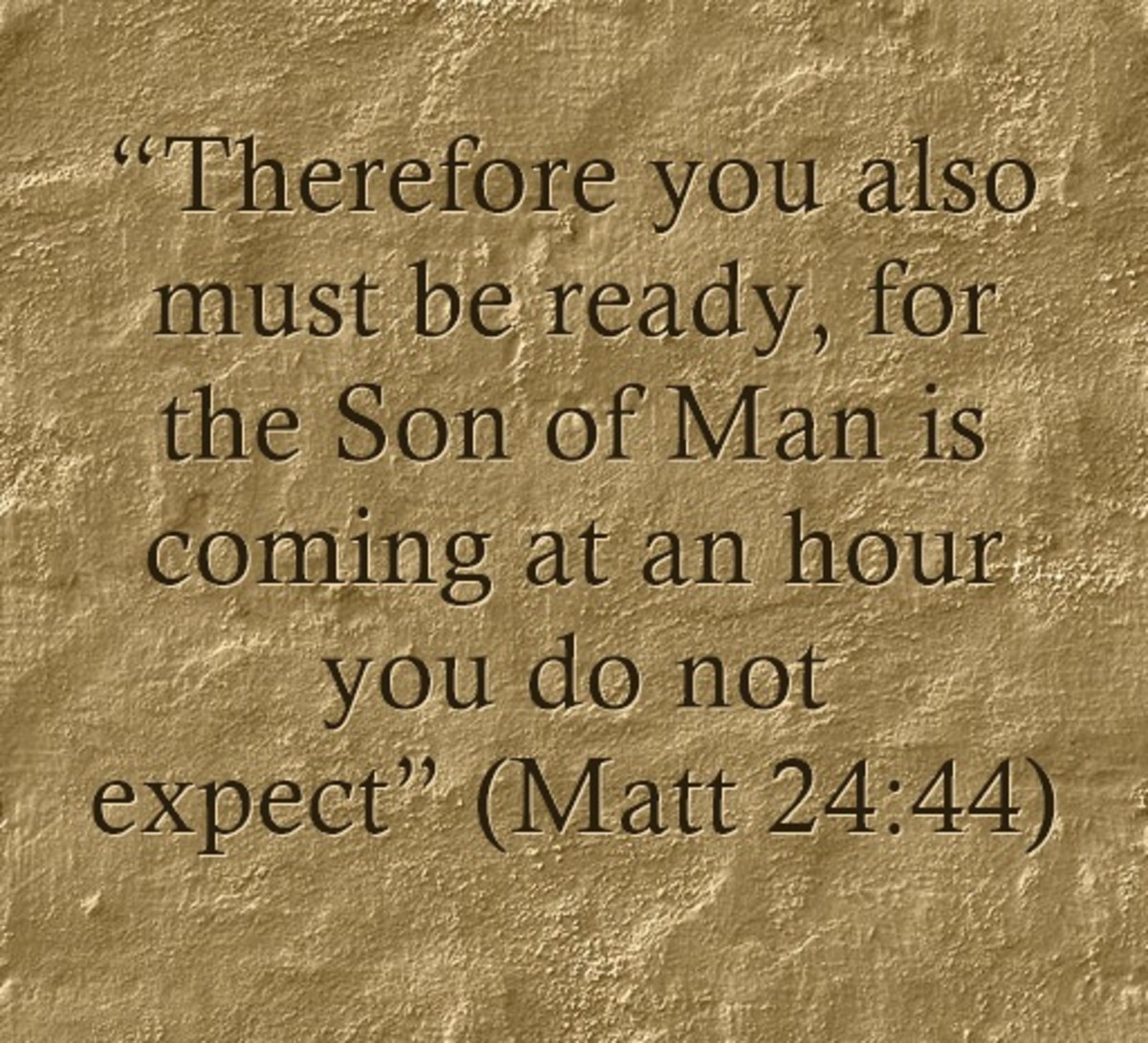Theology Essay on Irresistible Grace
Good Questions...
Recently I've had a friend ask me some good questions:
"Does God direct a person's destiny or can a person can actually change himself? What do Calvinists believe here? Is there no free will? Can a person change or does God control everything?"
These are weighty matters that Christians and non-Christians alike have been muddling on for centuries, and it doesn't just have to do with what a man called Calvin believed, because the verses that support "Calvinism" are all through the Bible, essential to our understanding of the gospel.
Yes, God does direct a person's destiny. Some call it "fate," others "luck," but Christians understand it to be God. "'For I know that plans I have for you,' declares the Lord, 'Plans to prosper you and not to harm you, to give you a future and a hope.'" Jer. 29:11. He also directs the salvation of those He wants to be saved: "... in whom also we have obtained an inheritance, being predestined according to the purpose of Him who works all things according to the counsel of His will, that we who first trusted in Christ should be to the praise of His glory." Eph. 1:11-12 (read all of Ephesians 1 for more on this topic).
At the same time, God calls and commands all men to obedience, to faith, to belief in Him as if we all have the ability to choose or reject Him. He gives the order: "Believe on the Lord Jesus and you shall be saved," as if it is up to our will and our own action to believe, as if that is what gives us salvation.
This seems incongruous. Our minds can't fathom how God can at once be completely in control of all things, all powerful and directing all things, like so many of the Scriptures say, and at once how we are able to make decisions and actions of the will either for or against God as so many of the Scriptures also say. This is a mystery, and no-one by the name of Christ can even attempt to explain how those two "opposites" can reconcile. All that Calvinists can claim is that we believe both "sides" are true, and that God has worked it so that He is in control, but we are still fully responsible if we don't obey Him.

What About "Free Will?"
"Free will" is a phrase that many hold up as a magnifying glass whenever any doubt comes up about our control over our own lives. In truth, when has anything we've ever done been free? We want to be kind, to love without self-aggrandizement, to have wisdom and knowledge about what to say and how to act in every situation. In short, we want to be good. However, we are under the control of wickedness. Ever since Adam's disobeyed God, we have all been disobeying God too. We are captive to our evil hearts. Even though we want to do good, we cannot. Our wills are not free.
Ephesians 2 explains this captivity as us actually being dead: "And you He made alive, who were dead in trespasses and sins..." Eph 2:1-6. That's where the sovereignty of God comes in. We're dead. Dead people cannot do anything, at all, to try to make themselves alive. So God loves us, while we're dead to Him and completely shut off to Him, and decides to give us a spark of grace. A spark of life. With that "quickening" (an old-fashioned King James word meaning "livening" or "awakening") we are now able to grasp Jesus for salvation, completely with the strength and faith that God gave us in the first place! As the passage in Ephesians continues, "God, who is rich in mercy, because of His great love with which He loved us, even when we were dead in trespasses, made us alive together with Christ (by grace you have been saved) and raised us up together, and made us sit together in the heavenly places in Christ Jesus." In a nutshell: through Christ many have come back from the dead. He also defeated our captivity by "taking captivity captive." (Psalm 68:18 and Ephesians 4:8.) As Christians, our bondage and slavery to sin is now captured by our Lord and King, Christ Jesus, so we are no longer slaves to sin. We now have freedom! We have a "free" will, for our will is freed from its addiction to sin.
In a spoonful:
- All men are dead to all that is good: unable to even try to be good without evil or self-serving motives. "For all have sinned and fall short of the glory of God." Romans 3:23
- All men are also captive: captive to the lusts of their heart and unable to do anything other than what their own cruel, bitter, self-worshipping hearts want to do. "Jesus answered them, 'Most assuredly, I say to you, whoever commits sin is a slave of sin.'" John 8:34
- But God "ascended on high, He led captivity captive, and gave gifts to men." Ephesians 4:8. And "even when we were dead in trespasses, [He] made us alive together with Christ (by grace you have been saved)." Ephesians 2:5.

Remote Control Vs. Irresistible Grace
However, when most people use the term "free will," they mean "free" in the sense of not being forced into a relationship with Christ, and not being controlled by God like a robot. I agree: a relationship that is forced is not a relationship. In the same way, no-one should be forced into accepting an offer of marriage, into becoming someone's friend, or into adopting a child.
Spurgeon explained the cooperation of both free will and God's sovereignty when he explained it this way: God commands all men to obedience, to repentance, to a relationship with Him. This command is for all men, everywhere, and Christ's death is available to all men everywhere. God knew that no men would be able to respond to His command (because we are dead in our sin) so He chose some that He would "effectually call," meaning some to whom He would give the strength and will to respond. Another term for this is "irresistible grace." To use the analogy of marriage again, irresistible grace is that winning, sweet smile which accompanies the marriage proposal from a man of stellar character. His question, "Will you marry me?" is accompanied by such sweetness, such tender words, such life-giving promise of blessing, and such a man(!) that it is irresistible to refuse, and nor would she dream of refusing. In the same way, we who God has chosen to "propose to" cannot resist God, but nor would we want to. His love is too sweet, His compassions too lovely, His grace too irresistible to resist. We are drawn by cords of mercy that we cannot, and want not, to fight. God still calls us to obey, and this requires an act of our will, and a personal choice and desire to obey. Yet at the same time, He is the one who gives us the grace to repent and come to Him for salvation. He is the one who enables us to obey. But we are not forced. I know our minds cannot make these two ideas fit together logically. Is it me who obeys God? Or is it God who obeys God--through me? Is it me who loves God, or is it God who loves God-- using me to do it? The answer is yes. All of the above.
Can We Lose Our Salvation?
The answer is found in this verse: "My sheep hear My voice, and I know them, and they follow Me. And I give them eternal life, and they shall never perish; neither shall anyone snatch them out of My hand. My Father, who has given them to Me, is greater than all; and no one is able to snatch them out of My Father's hand." John 10:27-30. When God saves someone, that person has a change in her heart. She is alive now, and now she cares about spiritual and eternal things more, she loves God, and she loves to serve and obey Him (not because she thinks she will lose her salvation if she doesn't obey, but because she wants to serve Him and please Him, out of love and gratitude). The Christian's heart will continue to change as she grows in her love for the Lord. God will work on her heart to teach it and train it in greater and greater obedience and joy in Him (called sanctification). At this point, we as Christians have a lot of work to do on our free wills. Our wills have habitually served sin, but now our wills have been won and bought by Christ. Our wills are now servants of Christ. His Holy Spirit is now at work on our wills, minds, and hearts, bringing them into closer and sweeter fellowship with God. Again, He is not robotically forcing us to obey Him; it is the Holy Spirit compellingly calling (effectively calling) so that we don't want to disobey, and we discipline ourselves to obey.
Some say that this verse doesn't mean we cannot "snatch ourselves" from God's hand. However, this seems inconsistent with the grammatical meaning of the verse. "No one" must include myself. If you think about it, there really can be no repentance good enough, not even good works good enough, that we can do, that will prove to God that we are good enough to "stay saved." How could we hold up our meager little tithes and offerings, our words of kindness or encouragement, to a holy God who causes even angels to tremble, and think that it would impress Him into giving us eternal life!? No, any good we do has to be done through Him. We are incapable of doing any good unless God is the cause behind it. "For by grace you have been saved through faith, and that not of yourselves; it is the gift of God, not of works, lest anyone should boast." Ephesians 2:8-9. We human creatures love to boast. We want all the world to honor us, to have others lift up our example as the truly good, truly magnanimous, spiritual person. Imagine if it had been our own good works that had brought us salvation! We would be boasting all over the place. If not out loud, then certainly we would do it in our thoughts of ourselves.

What About...?
What about those who said they were saved and acted like they had true repentance for awhile, but now have completely rebelled against God and become more wicked than before? Haven't they lost their salvation?
Sometimes people who we think are saved and alive in God seem to change for the worse: perhaps rebelling against authority, against God, living a life of sin without repentance or concern for the eternal consequences. If they continue ignoring their conscience and there doesn't seem to be any life in them, then there is a huge possibility that they never were saved in the first place. The theological word for a person like this is "apostate," meaning they were "with" us in the sense that they belonged to a local church, confessed to belong to Christ, but then fell by the wayside when temptation came and never softened to God. Hitler, Stalin, and Darwin were all apostates. They had been raised in homes with Christian parents, and their parents all probably thought their children were saved at one time. But then those men ended up going against all that they had "known," to be true and right, and in the long run proved to those around them that they were dead in their sin and had never been saved in the first place.
There are also Christians (many of us, in fact, at one time or another) who do sometimes seem to "fall away" or have a dry period of almost deadness so that other Christians may doubt that we have the life of God in us at all. But if we are saved and do have the Spirit of God in us, then God will not let us smother that for long, and God's gracious mercy convicts us of our sin, picks us up again, brushes us off again, and helps us to obey Him again. Even our obedience is a gift from Him. All that we can do that has any smell of goodness or purity is from God and done by God. Yet, He commands us to be holy (impossible in our own strength!) and commands us to be good (and we hardly know how!). Yet we seek to obey Him and strive with our wills to do as He desires.
Nothing saves but Christ-- not even our choice to "accept" Him can save us (though if we do choose to accept Him, we can thank God that He has softened our hearts to Him). It is only Christ that causes us to have faith in Him, Christ that gives us the strength to not sin, Christ that causes us to repent of our sins. In short, it is Christ who saves us, not we ourselves. I can't imagine ever "repenting" thoroughly enough to merit staying saved. And I do repent! Repenting is a part of daily life for me: crying over my sins because I don't love God enough to be holy, that I don't love God enough to cast off all that He hates. Even that heart-rending repentance and turing around that I knew I had to do would never have been enough to take away the guilt I was holding. It had to be God and His grace: the only grace greater than my sin.
It is inconsistent to say God should be glorified above all else and is deserving of all honor, yet at the same time to say that He can't show effective salvation to anyone without their participation and their "acceptance" of Him. The Bible never said, "Accept the Lord Jesus Christ into your heart and you shall be saved." The Bible does say, "Believe on the Lord Jesus Christ and you shall be saved." God causes us to believe by effectively and irresistibly calling us to Him. A sad and sorry salvation is one we have to pull off ourselves. How can we raise ourselves from the dead?
God Cannot Cause Us to Sin
Another question often comes up is: if God is in control of everything, then that would mean He is also would make people sin, right? But that goes against His nature of perfect goodness.
This understanding of God is right. He never makes people do evil things. It is completely against His nature. A verse that illustrates this is: "Let no one say when he is tempted, "I am tempted by God"; for God cannot be temped by evil, nor does He Himself tempt anyone. But each one is tempted when he is drawn away by his own desires and enticed." James 1:13-14.
God is the one who changes people's lives for the better, not ourselves. We are the ones who sin, not God. We can only sin. God can only do good. If it appears that we do any good, it is really God doing good in us and through us. "But we are all like an unclean thing, and all our righteousnesses are like filthy rags." Isaiah. 64:6.

The Mystery of Irresistible Grace
This may have just muddled things further in your mind, but I've done my best (and so did Calvin) to take all Scripture into account, not ignoring any of it because we cannot get our puny little human minds to put it together logically. I am still learning, myself! My family studied and struggled with these concepts for years, but in the end, it just came down to us realizing that there was Scripture back-up for both God's sovereignty and man's free will-- and there is not any perfect way to get our finite, sinful minds to wrap around that. We realized:
- God is in control of all things, and all God does is good. God deserves all glory and honor for any good that is done, whether on earth or in heaven.
- God calls us to obey Him, and to repent of our wickedness, which takes an act of our will, a personal belief in Him, a choice of life over death.
- Both of these statements are true, and God has worked a marvelous salvation for us in spite of us not being able to understand how they both work together. All of the Word of God is true, so if there are any parts that may seem inconsistent with each other, it's just because our knowledge is finite, our intelligence is marred by my sin, and our hearts are not big enough to love such a big and wise and merciful God. We know what we are called to do: Repent, believe on the Lord Jesus Christ and you shall be saved. And we know what God will do: God will work all things together for good, to those who are called according to His purpose.
I attribute any collision of the doctrine of the free will and the doctrine of God's sovereignty to our own inept ability to understand the mysteries of God, which are great and deep. "How unsearchable are His judgments, and His ways past finding out!"
By God's grace, let us pursue holiness, without which no man will see the Lord.
© 2009 Jane Grey








